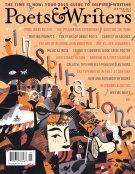In her iconic essay “How It Feels to Be Colored Me,” Zora Neale Hurston wrote of her experience as the sole black scholar at Barnard College in the mid-1920s. “I feel my race. Among the thousand white persons, I am a dark rock surged upon, and overswept, but through it all, I remain myself,” she wrote. “When covered by the waters, I am; and the ebb but reveals me again.” Hurston could just as easily have been referring to the publishing industry in 2015 rather than the academic world in 1926. A Publishers Weekly survey reported that in 2013 only 1 percent of polled respondents in the publishing industry identified themselves as African American. And everyone from the late Walter Dean Myers and his son Christopher Myers to Daniel José Older and Junot Díaz has written about how publishing’s overwhelmingly white environment can impact writers and readers of color.
That’s why the Washington, D.C.–based Hurston/Wright Foundation, named in honor of Hurston and Richard Wright, and which celebrates its twenty-fifth anniversary this year, remains so important. As one of the few organizations in the country dedicated to African American writers, it is the only one that seeks to discover, mentor, educate, and honor black writers of all ages, across all genres. The foundation also possesses a much sunnier outlook for the future of black literature, if the perspective of president emeritus and cofounder Marita Golden is any indication. “I’ve been a published writer long enough to have seen several revolutions affect the publishing industry and the lives of writers…. The canvas is much more complex, much more dimensional, and much more interesting—and less depressing—than many people portray,” she says.
The Hurston/Wright Foundation was established in 1990, a time of economic prosperity that led to a “big burst of black writers,” Golden recalls. “There was a lot of money on Wall Street, a lot of money everywhere, and black writers—writers, period—saw a big piece of the action.” Golden and cofounder Clyde McElvene found it was an opportune time to start an organization that sponsored high school and college writing programs for black students, as well as workshops that connected aspiring African American adult writers with established authors.
But in the years since its inception, the foundation has witnessed its share of shifts in the literary-arts business. Golden points to the economic downturn of the late 2000s, saying, “There were layoffs in publishing that resulted in fewer black editors and agents.” The Hurston/Wright Foundation, however, continues to support emerging black writers through programs like its annual Legacy Awards, a series that for the past thirteen years has honored poets, fiction writers, and nonfiction writers of African descent. The awards have highlighted the work of legendary authors like Chinua Achebe, Nikki Giovanni, Sonia Sanchez, and Alice Walker, alongside new literary luminaries such as last year’s poetry recipient, Amaud Jamaul Johnson. The awards offer no monetary prize, but are considered among the most prestigious accolades presented within the black writing community.
These honors have also been instrumental in building a strong coalition of black writers from across the diaspora. Nigerian novelist Chimamanda Ngozi Adichie won the debut-fiction award in 2004, and last October Zimbabwean novelist NoViolet Bulawayo won the fiction award. Although celebration of the diasporic writer is nothing new for the foundation, Golden believes that the growing recognition for new African writers in the United States will help black literary voices survive, and even thrive, in the ever-changing publishing landscape.
This year, the Hurston/Wright Foundation plans to ring in its silver anniversary by reintroducing its weeklong adult writers workshops in the summer after a four-year hiatus (they will be led by Breena Clarke, Terrance Hayes, Wil Haygood, and Chinelo Okparanta), and by hosting weekend fiction and screenplay workshops in March and a poetry seminar with former U.S. poet laureate Natasha Trethewey in May, in various venues throughout the D.C. area. The foundation will also continue its summer writing workshops for black teens, thanks to a substantial grant from the News Corp media network, and hopes in the next several years to find a new permanent home in D.C. for its workshops and programs.
“It’s as good a time as we ever could imagine to be a black writer,” says Golden. “Retrenchment and shifts are natural, but they haven’t affected the imagination of black writers or their determination to be published. Every year, we have scores of writers who come through our workshops and get published. That’s why it’s really important for us to prepare for the next twenty-five years.”
Stacia Brown is a freelance writer and a mother living in Baltimore.









